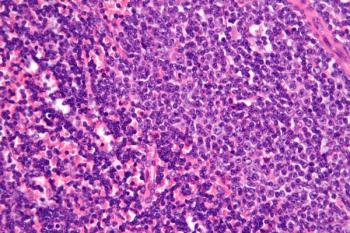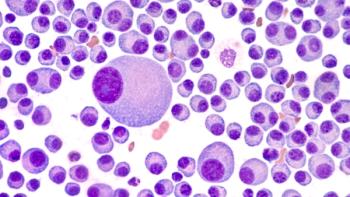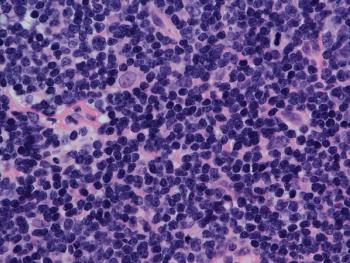
Crizotinib—a tyrosine kinase inhibitor with activity against ALK, ROS1, and MET—was granted FDA approval for use in pediatric patients with relapsed or refractory ALK-positive anaplastic large cell lymphoma.

Your AI-Trained Oncology Knowledge Connection!


Crizotinib—a tyrosine kinase inhibitor with activity against ALK, ROS1, and MET—was granted FDA approval for use in pediatric patients with relapsed or refractory ALK-positive anaplastic large cell lymphoma.

Based on findings from the trial of ciltacabtagene autoleucel, further investigation of the therapy in other populations of patients with multiple myeloma is already underway.

Investigators whose work was published in JAMA Network Open found that patients with low mammographic breast density were at higher risk of developing severe lymphedema.

A recent study revealed that by using standardized uptake value thresholds as determined by 2-[18F]-FDG PET/CT, investigators were able to predict the occurrence of Richter syndrome in patients with CLL.

IDH1/2 mutations have been detected in nearly 20% of patients with acute myeloid leukemia.

Merryman provided background for the study design investigating patients with relapsed or refractory diffuse large B-cell lymphoma.

The addition of the monoclonal antibody blinatumomab to hyper-CVAD could represent a potential option for extending remission times in patients with Philadelphia chromosome–negative B-cell acute lymphoblastic leukemia.

A study found that patients without recurrence of their oropharyngeal cancer at 5 years who were treated with intensity-modulated radiation therapy and had less tobacco exposure experienced optimal survival, but still had poorer outcomes when compared with the general population.

The goal of the CARTITUDE-1 study was to evaluate the use of ciltacabtagene autoleucel (cilta-cel; JNJ-68284528) chimeric antigen receptor T-cell therapy in heavily pretreated patients with relapsed or refractory multiple myeloma.

The study assessed the use of irinotecan and cetuximab (Erbitux) with or without vemurafenib (Zelboraf) in patients with BRAF V600E–mutated metastatic CRC who had been previously treated with 1 or 2 regimens.

“Based on the results of the QUAZAR study, it is very exciting to think that, by taking a tablet that is relatively well tolerated, we can help reduce relapse risk and improve survival,” lead study author Andrew H. Wei, MB, BS, PhD, said in a press release.

An industry leader in psychosocial oncology detailed the importance of patient-reported outcomes to the field as a whole and emphasized a number of key details to remember when examining these end points.

Hypogammaglobulinemia was found to be nearly universal for patients with multiple myeloma during treatment with daratumumab, suggesting a role for intravenous immunoglobulin.

A study published in JAMA Dermatology found changes in diagnostics and awareness may, in part, account for initial increases in incidence rates for Merkel cell carcinoma.

Though the majority of immune-related adverse events (irAEs) can be managed with corticosteroids and other immunosuppressive treatments, life-threatening and sometimes fatal events have still been reported thus revealing a need to develop measures for effective management.

The study was designed to evaluate the use of ciltacabtagene autoleucel in patients with relapsed or refractory multiple myeloma in the United States.

A group launched by the Global Health Research Unit of the National Institute for Health Research, which is currently seeking to determine the best surgical practices for cancer treatments, found that there is no additional risk of contracting COVID-19 for patients with cancer of the head and neck.

The clinical investigator and her colleagues sought to evaluate differences in baseline characteristics, treatment patterns, and survival outcomes in diabetic versus nondiabetic patients enrolled in the CONNECT Multiple Myeloma Registry.

A study of simulated patients with primary epithelial ovarian cancer found that none of the maintenance therapy regimens evaluated were cost-effective when compared with observation following frontline response.

The interview features comments on the emergence of T-cell engagers for therapy in patients with multiple myeloma made during the 2020 ASH Meeting & Exposition.

A study of the use of intravenous immunoglobulin on infections in patients with multiple myeloma receiving daratumumab suggested a role for the strategy in this patient population.

Merus announced that their bispecific antibody was granted fast track designation by the FDA for treating NRG1 fusion–positive solid tumors.

In response to the drug’s developer, the FDA added overall survival and other end point data to the label of darolutamide for its indication for treating patients with nonmetastatic castration-resistant prostate cancer who are receiving standard androgen-deprivation therapy.

“These findings highlight the dynamic interplay between both providers and their patients as well as between the latter’s [health literacy] and [shared decision making] that should inform the creation and promulgation of [shared decision making] guidelines, specifically when considering patients with low [health literacy],” wrote David-Dan Nguyen, MPH, and colleagues.

“As the number of AYA survivors continues to grow, there is a pressing need for targeted information, education, and intervention around sexual health, intimate relationships, and body image,” the Children’s Oncology Group (COG) AYA Oncology Discipline Committee wrote in a review.

Amid the uncertainty, researchers, clinicians, and pharmaceutical companies rose to face one of the greatest medical challenges of our time.

The director of clinical research in the Center for Cancer Care at White Plains Hospital spoke about what she intends to evaluate for a patient population with multiple myeloma and diabetes moving forward.

The phase 3 ARIEL4 trial is evaluating rucaparib (Rubraca) versus chemotherapy in patients with platinum-sensitive, partially platinum-sensitive, and platinum-resistant relapsed ovarian cancer and a BRCA mutation who have received 2 or more prior lines of chemotherapy.

Investigators on the BRUIN trial reported impressive response rates across multiple B-cell malignancies with the use of the Bruton tyrosine kinase inhibitor LOXO-305, especially in those with heavily pretreated mantle cell lymphoma.

The expert in urologic oncology spoke about new innovations that he believes will aid in treating patients with urologic cancers.